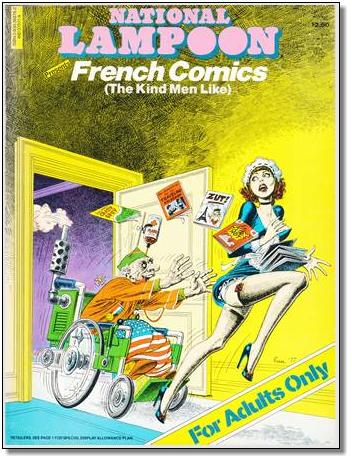2011 — 8 May: Sunday
Well, my Dad would have been 94 today, if he hadn't died 36 years ago, that is. And dear Mama doesn't even remember him now. Doesn't sound much like Intelligent Design to me. I'm about to declare my evening at an end1 following a stint of video entertainment. "My Normal" was quite good fun; "A marine story" was a stunning (and anger-provoking) piece of work, based on a collection of true stories. I've also finished the Alan Bennett which I doubt will be featuring on the BBC any time soon.
It seems to have been raining for much of the evening, quite heavily at times.
Despite the excellent music now playing on 6Music, I shall sign off for tonight with another picture of Christa from my recent set of scanned slides:

G'night.
Intellectuals? Who needs 'em?
Christa was often bemused by the attitude displayed in the UK toward any signs of intelligence. She had plenty of opportunity to observe this, particularly in our education sector, as she worked on the staff at Royal Holloway College in the 1970s, taught a variety of evening classes before Peter was born, worked in a school in Soton in the early 1990s, and [of course] kept a close eye on Junior2 throughout his travails in school and university. Relevant snippet:
Britain is a country in which the word "intellectual" is often preceded by the sneering adjective "so-called", where smart people are put down because they are "too clever by half" and where a cerebral politician (David Willetts) was for years saddled with the soubriquet "Two Brains". It's a society in which creative engineers are labelled "boffins" and kids with a talent for mathematics or computer programming are "nerds". As far as the Brits are concerned, intellectuals begin at Calais and gravitate to Paris, where the fact that they are lionised in its cafes and salons is seen as proof that the French, despite their cheese- and wine-making skills, are fundamentally unsound.
Tee hee. My chief memory of Paris is of having to be very careful where I stepped (a point mercilessly lampooned by Robert Altman in his vastly under-rated film "Prêt-à-porter" which itself underwent a last-minute change of title when it was feared nobody would understand the original). I note our antipodean cousins refer to the "tall poppy" syndrome, too. Mr Naughton's simultaneously produced an interesting list of 300 named intellectuals3 for people to throw rocks at. (Link.)
More tea, Mrs Landingham?
Firmware ahoy!
Having spotted upgraded official firmware for my (now discontinued) Oppo Blu-ray player, I've just finished loading it and all still seems well.
Feeling virtuous...
... after backing up several gigabytes of data to one of my external e-SATA drives, and noting that it's now already 12:52, I think I shall declare a lunch break. It's a pleasant mixture of sunshine and clouds out there with some breezes wafting around. No more rain so far. [Pause] Mercy me. Jarvis Cocker is playing some of the music from the film "Phase IV". Pretty obscure stuff. But at least it led me to an interesting blog post here about a film I recently bought ("After Hours") on DVD to replace the copy I'd made of my original LaserDisc.
Now why, I wonder, would I remember that Christa and I saw Edouard Molinaro's "L'emmerdeur" at the ABC Bloomsbury cinema in 1974? Something to do with thinking about obscure films, perhaps. By the way, Jerzy Skolimowski's film "Deep End" was discussed on the radio last week, and is being re-released as a BFI DVD in a month or so. Turned out Jarvis Cocker also remembers seeing it. I, in turn, had forgotten that Can did much of the music. And I've decided I'd like to see the same chap's "Moonlighting" (with Jeremy Irons, not the Bruce Willis / Cybil Shepherd TV show). I had a VHS copy of that many years ago.
Intangible mountains
As I read Iain McGilchrist's (fascinating, so far) examination of our asymmetric brains he's just described a mountain as having no objective reality...
A mountain that is a landmark to a navigator, a source of wealth to the prospector, a many-textured form to a painter, or to another the dwelling place of the gods, is changed by the attention given to it. There is no 'real' mountain which can be distinguished from these, no one way of thinking which reveals the true mountain.
Unfortunately, the weird way my own asymmetric brain is wired up, I immediately recalled a wonderful comic sequence titled "The 47th way of viewing Mount Fuji" by French comics artist F'Murr (originally published in 'Pilote' #13, June 1975) that appears in my treasured volume here:

It's a splendidly Gallic spoof on Hokusai's exquisite series of 36 paintings on a similar theme. And it, in turn, triggers memories of the Matt Madden book "99 ways to tell a story" that I mentioned here. That was inspired by Raymond Queneau's "Exercises in style" — and I borrowed that from the Hatfield Polytechnic library in about 1972. And later bought my own copy to give to Christa in 1980 as an Xmas present.
Assuming the rain holds off (and I heard a distant rumble of thunder about 30 minutes ago) plans are now a'foot for a road walk somewhere tomorrow. It's 19:46 and time for some moving pixels, I think.